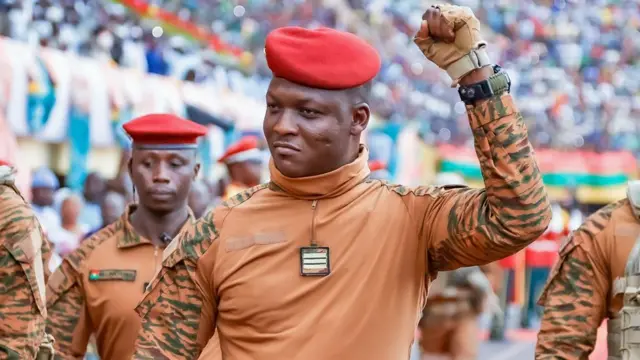Capt. Ibrahim Traoré: A New Era of Leadership in Burkina Faso
At 37 years old, Capt. Ibrahim Traoré commands attention as the leader of Burkina Faso’s military junta. Known for his charismatic persona, he advocates for a vision of pan-Africanism that critiques Western imperialism and neo-colonialism. His ascent to prominence, following a coup in 2022, has positioned him as a figure admired across Africa, drawing comparisons to revolutionary leaders like Thomas Sankara, who is often dubbed “Africa’s Che Guevara”.
Beverly Ochieng, a senior researcher at Control Risks, indicates that Traoré’s appeal is substantial, stating that politicians and thought leaders in countries such as Kenya are echoing the sentiment that “he is the man”. Ochieng explains that his rhetoric taps into a broader narrative of socio-economic dissatisfaction among Africans questioning enduring poverty amid rich natural resources.
A Departure from Colonial Influence
Under Traoré’s leadership, Burkina Faso has pivoted from its historic ties with France, turning instead towards Russia. This strategic redirection includes the assistance of a Russian paramilitary brigade and the implementation of left-leaning economic initiatives. Notably, the junta has established a state-controlled mining enterprise, mandating that foreign corporations provide a 15% stake in their local operations and impart essential skills to Burkinabé citizens.
This policy extends to Russian mining company Nordgold, which gained a license for gold operations just last month. As part of what Traoré dubs a “revolution”, the government is also constructing a gold refinery and launching national reserves for the first time in the country’s history.
| Initiative | Description |
|---|---|
| State-Owned Mining Company | Requires foreign firms to cede 15% of stakes and transfer skills. |
| Gold Refinery Development | Establishing national gold reserves for the first time in history. |
| Partnership with Russia | Deployment of Russian paramilitary forces and economic cooperation. |
Captivating the Public through Social Media
Traoré has harnessed social media to amplify his revolutionary image, despite facing criticism regarding misleading narratives. His memorable speech at the 2023 Russia-Africa summit, where he challenged African leaders to stop feigning obedience to imperial powers, gained significant traction. Russian media has played a substantial role in promoting his message.
His recent appearance at commemorations in Russia marking the Soviet victory over Nazi Germany reflected this partnership, as he aimed to draw parallels between Russia’s battle against imperialism and Burkina Faso’s own struggles.
A Complex Legacy Ahead
Despite his rapid rise to fame, Traoré’s administration has not resolved the ongoing Islamist insurgency threatening stability in Burkina Faso. His governance has been marked by crackdowns on dissent, affecting opposition figures, media, and civil society groups. Critics have faced harsh consequences, including frontline deployment against jihadist forces.
Rinaldo Depagne from the International Crisis Group attributes Traoré’s burgeoning popularity among youth to his relatable persona and media savvy. With a young median age of 17.7 years in Burkina Faso, Traoré embodies the potential for a renewed sense of hope, reminiscent of leaders like Sankara who championed justice and integrity in governance.
The Changing Political Landscape
The sentiment supporting military governance is growing in West Africa, as seen in a 2024 Afrobarometer survey revealing decreasing faith in democratic systems. Ghanaian analyst Prof. Kwesi Aning notes that many young Africans are increasingly disillusioned with traditional political structures failing to provide fundamental needs such as jobs and education. Traoré’s rise represents a shift towards alternative political visions amidst a backdrop of frustration with existing systems.
As Capt. Traoré continues to navigate the complexities of leadership amidst regional turmoil, his ability to unify aspirations for a new Africa will ultimately determine the sustainability of his regime and the legacy he hopes to build.


